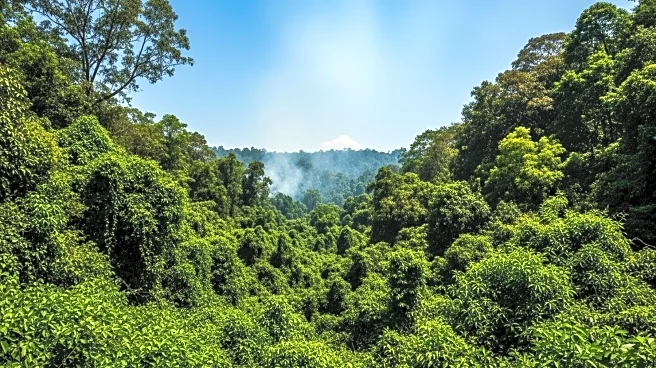What's Happening?
Recent research highlights a significant collapse in natural carbon sinks during 2023, primarily due to increased emissions from wildfires and drought conditions. The terrestrial biosphere absorbed almost no net carbon, exacerbated by Canadian wildfires and Amazon droughts. Additionally, marine carbon sinks decreased due to high surface temperatures affecting CO2 solubility. The El Niño conditions in 2023 contributed to warmer and drier global climates, intensifying biomass loss and emissions. Despite the weakening of El Niño in 2024, relief for the biosphere has not materialized, with continued hot conditions leading to further carbon losses.
Why It's Important?
The unexpected collapse of carbon sinks poses a challenge to current climate mitigation strategies, which rely heavily on land and marine ecosystems to absorb CO2. This development threatens global efforts to achieve carbon neutrality by 2030, as seen in the declining carbon uptake of European forests. The failure of models to predict these changes underscores the need for improved understanding and integration of factors like nutrient availability in climate models. The situation highlights the urgency of addressing deforestation and enhancing reforestation efforts to maintain carbon sink capacity.
What's Next?
Future efforts must focus on improving climate models to account for nutrient acquisition strategies and other ecological processes that impact carbon uptake. Additionally, global initiatives like the Glasgow Declaration need reinforcement to curb deforestation and promote forest conservation. These actions are critical to enhancing the resilience of carbon sinks and achieving long-term climate goals. Stakeholders, including governments and environmental organizations, must collaborate to implement effective policies and practices that mitigate wildfire risks and support ecosystem recovery.
Beyond the Headlines
The decline in carbon sinks not only affects climate mitigation but also has broader implications for biodiversity and ecosystem services. Deforestation and degradation reduce forest resilience, impacting local climates and increasing heat-related mortality. Addressing these issues requires a holistic approach that considers ecological, social, and economic dimensions, ensuring sustainable land use and conservation practices.











